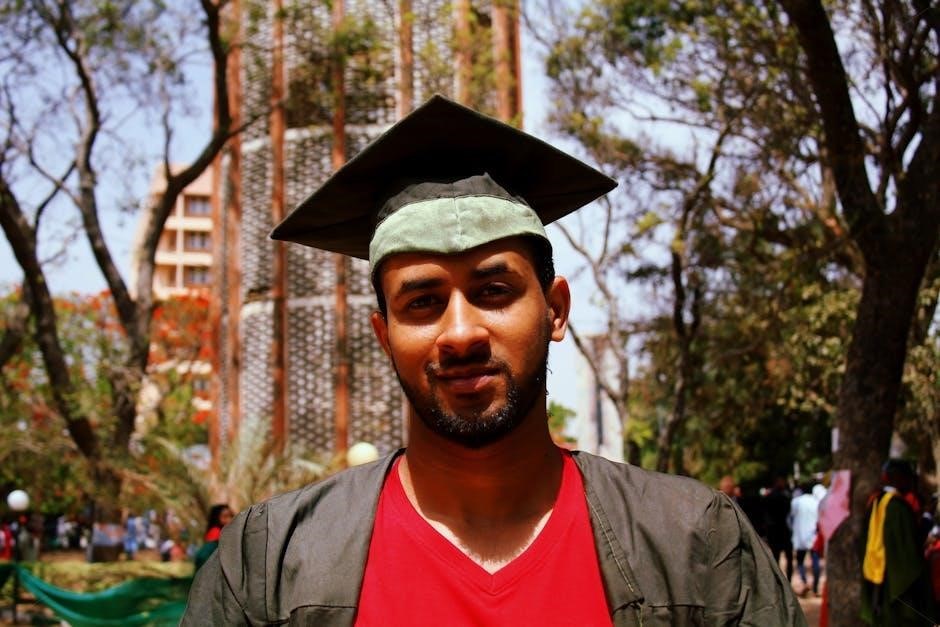Occupational therapy fieldwork bridges theoretical knowledge with practical application, offering hands-on experience essential for developing clinical skills. The Successful Occupational Therapy Fieldwork Student guide provides strategies for excelling in fieldwork, emphasizing preparation, emotional intelligence, and professional relationships to ensure successful outcomes.
Overview of Occupational Therapy as a Profession
Occupational therapy (OT) is a medically-based profession focused on enabling individuals to achieve independence in daily tasks. It combines didactic and clinical education to prepare practitioners who address physical, emotional, and cognitive challenges. OT promotes participation in meaningful activities, enhancing quality of life. The field requires a deep understanding of human development, adaptation, and environmental factors. With a strong emphasis on evidence-based practices, OT professionals work in diverse settings, from healthcare to schools. The Successful Occupational Therapy Fieldwork Student guide highlights the importance of clinical reasoning and interpersonal skills, essential for fostering client-centered care and successful outcomes in this rewarding profession.
The Importance of Fieldwork in Occupational Therapy Education
Fieldwork is a cornerstone of occupational therapy education, providing students with hands-on experience to bridge theoretical knowledge and practical application. It enables students to develop clinical reasoning, interpersonal skills, and the ability to adapt to diverse client needs. Through fieldwork, students apply evidence-based practices, refine problem-solving abilities, and build confidence in their professional roles. The Successful Occupational Therapy Fieldwork Student guide emphasizes the transformative impact of fieldwork, preparing students for real-world challenges. By immersing in clinical environments, students transition from learners to competent practitioners, ensuring they are ready to make meaningful contributions in their future careers.
Objectives of Occupational Therapy Fieldwork
Occupational therapy fieldwork aims to enhance students’ clinical skills, fostering their ability to apply theoretical knowledge in real-world settings. Key objectives include developing clinical reasoning, fostering professional growth, and preparing students for evidence-based practice. Fieldwork also seeks to cultivate interpersonal skills, enabling effective communication with clients and teams. The PEOP Model often guides this process, emphasizing client-centered care. By achieving these objectives, students transition from learners to competent practitioners, ready to address diverse client needs. The Successful Occupational Therapy Fieldwork Student guide underscores these goals, providing strategies to maximize fieldwork experiences and ensure students are well-prepared for their future roles in occupational therapy.

Preparing for Successful Fieldwork
Preparing for fieldwork involves understanding requirements, developing emotional intelligence, and building professional relationships. The Successful Occupational Therapy Fieldwork Student guide offers strategies to enhance readiness and confidence for clinical experiences.
Understanding the Requirements for Fieldwork Placement
Understanding fieldwork placement requirements is crucial for success. Students must meet specific criteria, including completion of prerequisite courses and clinical hours. Supervision by licensed occupational therapists is mandatory, ensuring safe and effective practice. Fieldwork levels, such as Level I and Level II, have distinct objectives, with Level II focusing on advanced clinical practice. Students must demonstrate competency in assessment, intervention, and documentation. Meeting these requirements ensures readiness for real-world challenges and aligns with professional standards. The Successful Occupational Therapy Fieldwork Student guide provides detailed insights to help students navigate these expectations effectively and prepare for their fieldwork experiences.
Developing Emotional Intelligence for Fieldwork Success
Emotional intelligence (EI) is crucial for fieldwork success, enabling students to navigate complex clinical environments effectively. Self-awareness, empathy, and effective communication are key components of EI. Students must recognize their emotions and biases, fostering resilience and adaptability. Empathy allows for deeper connections with clients, enhancing therapeutic relationships. Developing strong interpersonal skills ensures collaboration with teams and supervisors. The Successful Occupational Therapy Fieldwork Student guide emphasizes EI as a cornerstone of professional competence, helping students manage stress and build positive relationships. Cultivating EI not only enhances fieldwork performance but also supports long-term career success in occupational therapy.
Building Professional Relationships with Supervisors and Peers
Building strong professional relationships with supervisors and peers is essential for a successful fieldwork experience. Clear communication, mutual respect, and active listening foster a collaborative environment. Students should seek feedback regularly, demonstrating openness to growth and improvement. Positive interactions with peers enhance teamwork and shared learning opportunities. Supervisors play a critical role in guiding students, offering mentorship and support. The Successful Occupational Therapy Fieldwork Student guide highlights strategies for effective communication and relationship-building. By cultivating these connections, students create a foundation for professional development and future success in occupational therapy practice.

Key Skills for Occupational Therapy Fieldwork Students
Fieldwork students must develop critical thinking, adaptability, and effective documentation skills. Proficiency in evidence-based interventions and client-centered care ensures successful practice, fostering independence and meaningful outcomes.
Clinical Reasoning and Problem-Solving in Practice
Clinical reasoning is a cornerstone of occupational therapy, enabling students to analyze client needs and develop effective interventions. The Successful Occupational Therapy Fieldwork Student guide emphasizes the importance of integrating theoretical knowledge with real-world observations. By honing problem-solving skills, students can identify barriers to participation and design tailored strategies. This process involves assessing environments, adapting activities, and using evidence-based practices to promote client autonomy and engagement. Effective clinical reasoning ensures that interventions are client-centered and goal-oriented, fostering meaningful outcomes and professional growth for aspiring therapists.
Effective Communication Strategies with Clients and Teams
Effective communication is vital in occupational therapy, fostering trust and collaboration between clients, families, and healthcare teams. The Successful Occupational Therapy Fieldwork Student guide highlights active listening, empathy, and clear articulation as key strategies. Students should adapt communication styles to meet diverse client needs, ensuring understanding and engagement. Regular updates with supervisors and interdisciplinary teams enhance coordination of care. Open dialogue also supports client-centered practice, empowering individuals to participate actively in their therapy plans. Mastering these strategies not only improves client outcomes but also strengthens professional relationships, essential for successful fieldwork experiences and future practice.
Time Management and Organization for Fieldwork Success
Effective time management and organization are critical for thriving in occupational therapy fieldwork. The Successful Occupational Therapy Fieldwork Student guide emphasizes prioritizing tasks, setting realistic goals, and maintaining a structured schedule. Balancing client sessions, documentation, and professional development requires meticulous planning. Utilizing digital tools and checklists can enhance efficiency, ensuring all responsibilities are met without compromising quality. Proactive organization fosters a productive environment, allowing students to focus on delivering high-quality care while managing the demands of fieldwork. By mastering these skills, students can reduce stress, meet expectations, and achieve success in their fieldwork experiences.

Level I and Level II Fieldwork: Differences and Significance
Level I introduces foundational concepts through observation, while Level II focuses on advanced clinical practice, as outlined in the Successful Occupational Therapy Fieldwork Student guide.
Level I fieldwork introduces students to the foundational concepts of occupational therapy, focusing on observation, basic client interaction, and initial skill development. These experiences are designed to bridge theoretical knowledge with practical application, allowing students to understand the role of an occupational therapist in various settings. Supervised by licensed professionals, students engage in activities such as client assessments, documentation, and communication strategies. The Successful Occupational Therapy Fieldwork Student guide emphasizes the importance of Level I in building confidence and competence. It serves as a critical stepping stone, preparing students for the more advanced responsibilities of Level II fieldwork and fostering a strong foundation for their future practice.
Transitioning to Level II Fieldwork: Advanced Clinical Practice
Level II fieldwork marks a significant advancement in clinical practice, where students engage in direct client care, complex assessments, and interventions. This phase requires applying theoretical knowledge to real-world scenarios, refining clinical reasoning, and demonstrating competence in evidence-based practice. Students are expected to work independently, with occasional supervision, to develop advanced skills in client-centered care. The Successful Occupational Therapy Fieldwork Student guide highlights strategies for mastering this transition, emphasizing the importance of emotional intelligence, effective communication, and professional accountability. Level II fieldwork is a critical milestone, preparing students for the demands of professional practice and fostering confidence in their ability to deliver high-quality care.
Successfully Navigating the Transition Between Levels
Transitioning between fieldwork levels requires strategic preparation and self-awareness. Students must reflect on their Level I experiences, identifying strengths and areas for growth. Seeking feedback from supervisors and peers is crucial for refining skills. A smooth transition involves staying organized, maintaining clear communication with educators, and adapting to new clinical environments. The Successful Occupational Therapy Fieldwork Student guide emphasizes the importance of emotional resilience and flexibility during this process. By leveraging past experiences and embracing challenges, students can build confidence and competence, ensuring a seamless progression to advanced practice in Level II fieldwork and beyond.

Clinical Reasoning and Evidence-Based Practice
Clinical reasoning and evidence-based practice are cornerstone skills for occupational therapy students. The PEOP Model guides effective decision-making, while evidence-based practices ensure interventions are grounded in research and best outcomes.

Applying Theoretical Knowledge to Real-World Scenarios
Occupational therapy fieldwork enables students to apply theoretical concepts to practical scenarios, enhancing their ability to address client needs effectively. The Successful Occupational Therapy Fieldwork Student guide emphasizes the importance of integrating classroom learning with real-world experiences, allowing students to develop clinical reasoning skills. By applying frameworks like the PEOP Model, students can systematically approach client assessments and interventions, ensuring evidence-based practices. This integration not only fosters professional competence but also prepares students for the challenges of clinical practice, bridging the gap between education and real-world application in occupational therapy.
Using Evidence-Based Practice in Fieldwork Settings
Evidence-based practice (EBP) is integral to occupational therapy fieldwork, ensuring interventions are grounded in research and best practices. The Successful Occupational Therapy Fieldwork Student guide underscores the importance of integrating EBP into clinical decision-making. By applying research findings to real-world scenarios, students develop interventions that are both effective and client-centered. This approach not only enhances clinical outcomes but also fosters a culture of continuous learning and professional growth. Incorporating EBP in fieldwork settings equips students with the tools to deliver high-quality care, aligning with industry standards and preparing them for future practice.
The Role of the PEOP Model in Clinical Reasoning
The PEOP Model (Person, Environment, Occupation, and Performance) serves as a structured framework for clinical reasoning in occupational therapy. It enables students to analyze a client’s personal factors, environmental influences, and occupational performance, guiding interventions to enhance functionality and independence. By focusing on these interconnected elements, the PEOP Model helps students integrate theoretical knowledge with practical observations. This model is particularly emphasized in the Successful Occupational Therapy Fieldwork Student guide, as it fosters effective clinical decision-making and evidence-based practice. Mastery of the PEOP Model is essential for delivering client-centered care and achieving successful outcomes in fieldwork settings.

Supervision and Feedback in Fieldwork
Effective supervision and feedback are crucial for professional development during fieldwork. Supervisors provide guidance, while constructive feedback enhances clinical reasoning and skill refinement, as highlighted in the Successful Occupational Therapy Fieldwork Student guide.
Maximizing Learning from Supervisor Feedback
Maximizing learning from supervisor feedback is essential for professional growth during fieldwork. Actively listening to feedback and asking clarifying questions fosters understanding. Reflecting on feedback and implementing changes enhances clinical reasoning and practice skills. Supervisors provide insights into strengths and areas for improvement, guiding students toward competency. The Successful Occupational Therapy Fieldwork Student guide emphasizes the importance of using feedback to refine interventions and documentation. Students should document feedback and track progress over time. Leveraging supervisor expertise through open communication and a growth mindset ensures a productive learning experience. This collaborative approach helps students develop the skills and confidence needed for successful fieldwork outcomes.
Documenting and Evaluating Student Performance
Accurate documentation and evaluation of student performance are critical for assessing progress during fieldwork. Supervisors use standardized tools, such as the AOTA Fieldwork Performance Evaluation (FWPE), to assess clinical reasoning, communication, and professionalism. Students should maintain detailed records of interventions, client responses, and reflections to support their development. Regular evaluations provide constructive feedback, highlighting strengths and areas for improvement. The Successful Occupational Therapy Fieldwork Student guide emphasizes the importance of self-assessment and leveraging supervisor feedback to refine skills. Transparent documentation ensures accountability and fosters a culture of continuous improvement, preparing students for future professional practice and ethical standards in occupational therapy.
Addressing Challenges in the Supervisor-Student Relationship
Building a positive supervisor-student relationship is vital for successful fieldwork. Open communication and mutual respect are key to addressing challenges. Supervisors should provide clear expectations and constructive feedback, while students should actively listen and seek clarification. Regular check-ins can help identify and resolve conflicts early. The Successful Occupational Therapy Fieldwork Student guide emphasizes the importance of emotional intelligence and self-advocacy in navigating these dynamics. By fostering a collaborative environment, both parties can work together to overcome challenges, ensuring a productive and enriching fieldwork experience that promotes professional growth and skill development for the student.

Navigating Challenges in Fieldwork
Fieldwork presents challenges like managing stress, adapting to new environments, and building client rapport. Effective time management and communication are key to overcoming these obstacles successfully.
Managing Stress and Burnout During Fieldwork
Managing stress and burnout during fieldwork is crucial for maintaining well-being and professional performance. Common stressors include high expectations, heavy workloads, and emotional demands of client interactions. Students can mitigate these challenges by practicing mindfulness, setting realistic goals, and maintaining a healthy work-life balance. Seeking support from supervisors, peers, and mentors is also vital. The Successful Occupational Therapy Fieldwork Student guide emphasizes the importance of self-care and stress management techniques, such as time management and prioritization, to ensure resilience. Proactive habits and reflection can help students navigate these challenges effectively, fostering both personal and professional growth during their fieldwork experiences.
Handling Difficult Client Situations Effectively
Handling difficult client situations requires a combination of empathy, active listening, and problem-solving skills. Occupational therapy students often encounter clients with diverse needs, emotions, and behaviors, which can be challenging. Strategies such as remaining calm, setting clear boundaries, and using therapeutic communication can help de-escalate tensions. The PEOP Model, emphasizing client-centered care, guides students to understand and address underlying needs. Reflecting on these interactions and seeking feedback from supervisors enhances resilience and competence. The Successful Occupational Therapy Fieldwork Student guide offers practical tips for navigating such scenarios, ensuring effective client outcomes and professional growth. Mastering these skills is essential for building strong therapeutic relationships and achieving success in fieldwork;
Overcoming Barriers in Role-Emerging Placements
Role-emerging placements present unique challenges as students navigate non-traditional settings where occupational therapy roles may not be clearly defined. Barriers such as lack of structure, limited resources, or unclear expectations can hinder growth. To overcome these, students must adapt by demonstrating initiative, flexibility, and strong communication skills. Collaborating with supervisors to establish clear goals and seeking feedback can provide clarity. Additionally, leveraging theoretical frameworks like the PEOP Model can guide clinical reasoning and problem-solving in unfamiliar environments. Building rapport with clients and stakeholders is crucial for establishing legitimacy in these emerging roles. The Successful Occupational Therapy Fieldwork Student guide offers strategies to address these challenges effectively, fostering resilience and innovation in practice.

Resources for Occupational Therapy Students
The Successful Occupational Therapy Fieldwork Student guide offers essential strategies for fieldwork success. Additional tools include fieldwork handbooks and online platforms. AOTA guidelines also provide valuable frameworks for practice.
The Successful Occupational Therapy Fieldwork Student PDF Guide
This comprehensive guide is tailored for OT and OTA students, offering practical strategies for navigating fieldwork successfully. It covers preparation, clinical reasoning, and professional relationships. The PDF includes checklists, real-life examples, and evidence-based practices, making it an invaluable resource. Designed to support students from initial placements to advanced levels, the guide ensures readiness for both Level I and Level II fieldwork. It also addresses emotional intelligence, time management, and handling challenges, providing a holistic approach to fieldwork education. Available for instant download, this tool is essential for students aiming to excel in their fieldwork experiences and transition smoothly into professional practice.
Additional Tools and Resources for Fieldwork Preparation
Beyond the Successful Occupational Therapy Fieldwork Student guide, various tools enhance fieldwork readiness. The American Occupational Therapy Association (AOTA) offers detailed guidelines, while online platforms provide interactive learning modules. Fieldwork handbooks and printable quick-reference guides, such as the Occupational Therapy Pediatric Quick Reference Guide, are invaluable for practical insights. Additionally, generative AI tools are emerging as innovative educational resources. These resources complement traditional materials, offering diverse learning opportunities. Students can also access academic journals and role-emerging placement guides to deepen their understanding. Together, these tools ensure a well-rounded preparation for the demands of fieldwork, fostering both clinical competence and professional growth.
Utilizing AOTA Guidelines for Fieldwork Success
The American Occupational Therapy Association (AOTA) provides comprehensive guidelines to ensure effective fieldwork experiences. These guidelines outline expectations for both students and supervisors, emphasizing competency-based assessments. The AOTA Fieldwork Performance Evaluation (FWPE) is a key tool for documenting student progress and identifying areas for improvement. By adhering to AOTA standards, students can align their practice with professional benchmarks. Additionally, AOTA resources offer frameworks for ethical practice, cultural competence, and supervision strategies. Leveraging these guidelines helps students navigate fieldwork challenges confidently, ensuring they develop the skills and professionalism required for successful transitions into occupational therapy practice. These resources are indispensable for achieving fieldwork success.
Occupational therapy fieldwork is pivotal for professional growth, with resources like The Successful Occupational Therapy Fieldwork Student guiding the journey. Future advancements promise enhanced educational frameworks, ensuring continued excellence in practice.
Reflecting on Fieldwork Experiences for Professional Growth
Reflecting on fieldwork experiences is crucial for fostering professional growth in occupational therapy. It allows students to identify strengths, areas for improvement, and align their practice with professional standards. By documenting and analyzing their experiences, students can deepen their understanding of client-centered care and refine their clinical reasoning. The Successful Occupational Therapy Fieldwork Student guide emphasizes the importance of self-reflection as a tool for continuous improvement. This practice not only enhances competence but also prepares students for the challenges of professional practice, ensuring they are well-equipped to address diverse client needs effectively.
Preparing for the Transition to Professional Practice
Transitioning to professional practice after fieldwork requires integrating learned skills, ethical decision-making, and a commitment to lifelong learning. Students must apply clinical reasoning, communication, and problem-solving abilities to real-world scenarios. The Successful Occupational Therapy Fieldwork Student guide highlights the importance of self-awareness, resilience, and adaptability in navigating this transition. Building on fieldwork experiences, students should reflect on their growth and identify areas for continued development. By aligning their practice with professional standards and staying updated on evidence-based practices, they can confidently enter the workforce, ready to contribute to improving clients’ lives and advancing the occupational therapy profession.
The Future of Occupational Therapy Fieldwork Education
The future of occupational therapy fieldwork education emphasizes integrative learning, technology, and evidence-based practices. Generative AI and virtual simulations are emerging as tools to enhance fieldwork training, offering immersive learning experiences. The PEOP model continues to guide clinical reasoning, fostering mastery in real-world scenarios. Collaborative efforts between academic programs and clinical sites will strengthen fieldwork opportunities, ensuring students are well-prepared for diverse practice settings. Resources like the Successful Occupational Therapy Fieldwork Student guide play a pivotal role in equipping students with essential skills and strategies for navigating the evolving landscape of occupational therapy education and practice.

References
Key resources include The Successful Occupational Therapy Fieldwork Student by Karen Sladyk, published by SLACK Incorporated, and AOTA fieldwork guidelines, essential for comprehensive preparation and practice.
Key Publications and Resources
The Successful Occupational Therapy Fieldwork Student by Karen Sladyk is a cornerstone resource, offering practical strategies for navigating fieldwork. Published by SLACK Incorporated, it is widely regarded as an essential guide for OT students. Additional resources include fieldwork handbooks, AOTA guidelines, and academic journals like the American Journal of Occupational Therapy. These publications provide evidence-based practices, ethical standards, and real-world insights. Online platforms, such as AOTA’s Fieldwork Toolkit, also offer valuable tools for preparation and success. These resources collectively support students in transitioning from academic knowledge to clinical proficiency, ensuring a well-rounded and effective fieldwork experience.
Academic Journals and Fieldwork Handbooks
Academic journals like the American Journal of Occupational Therapy and OT Practice offer evidence-based insights and practical strategies for fieldwork success. Fieldwork handbooks, such as those provided by universities like Alvernia and Eastern Kentucky, detail expectations, evaluation criteria, and professional development tips. These resources are tailored to help students navigate Level I and Level II fieldwork, ensuring a smooth transition from theory to practice. They also emphasize clinical reasoning, effective communication, and time management, addressing both the technical and interpersonal aspects of occupational therapy. By leveraging these materials, students can enhance their preparedness and performance in real-world clinical settings, fostering a strong foundation for their professional careers.
Online Platforms for Continuing Education
Online platforms like the American Occupational Therapy Association (AOTA) website and OccupationalTherapy.com offer extensive resources for continuing education. These platforms provide access to webinars, courses, and downloadable guides, such as the Successful Occupational Therapy Fieldwork Student PDF, which equip students with practical strategies for fieldwork success. Additionally, the NBCOT Navigator and other digital tools offer interactive learning modules tailored to occupational therapy education. These resources are designed to enhance clinical reasoning, evidence-based practice, and professional development, ensuring students are well-prepared for both Level I and Level II fieldwork experiences. They also support lifelong learning for professionals in the field, aligning with AOTA standards and best practices.
